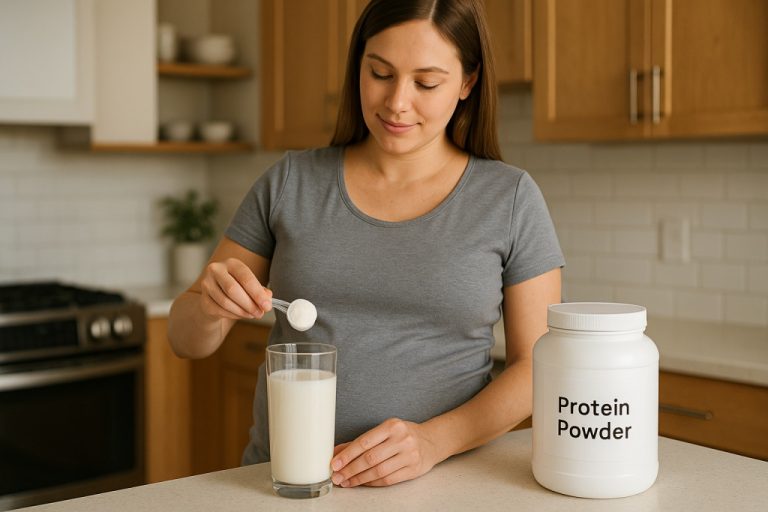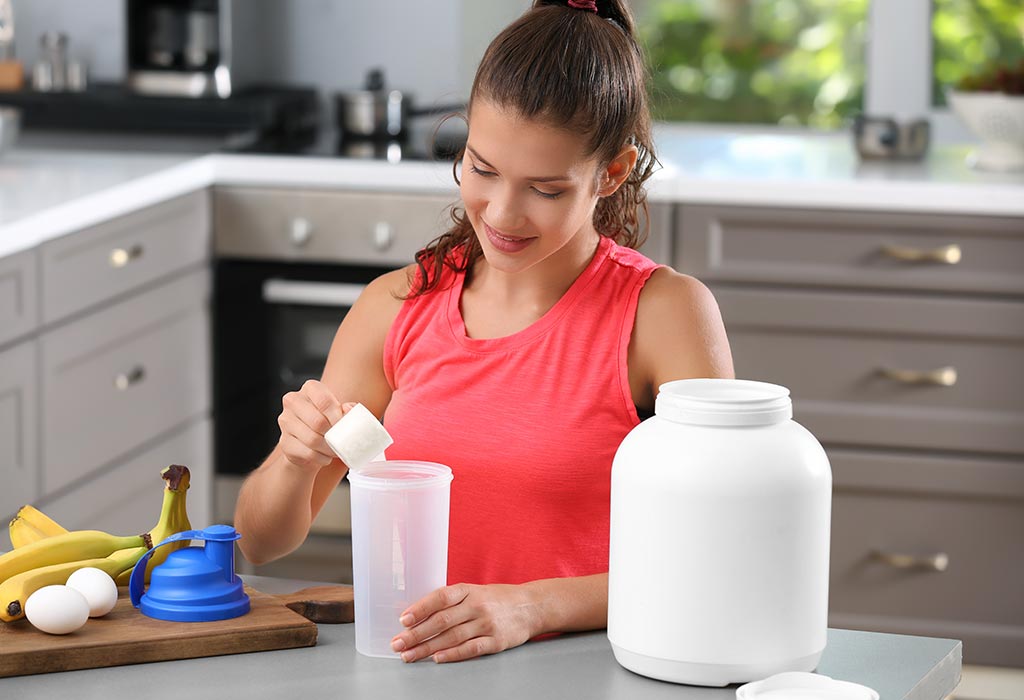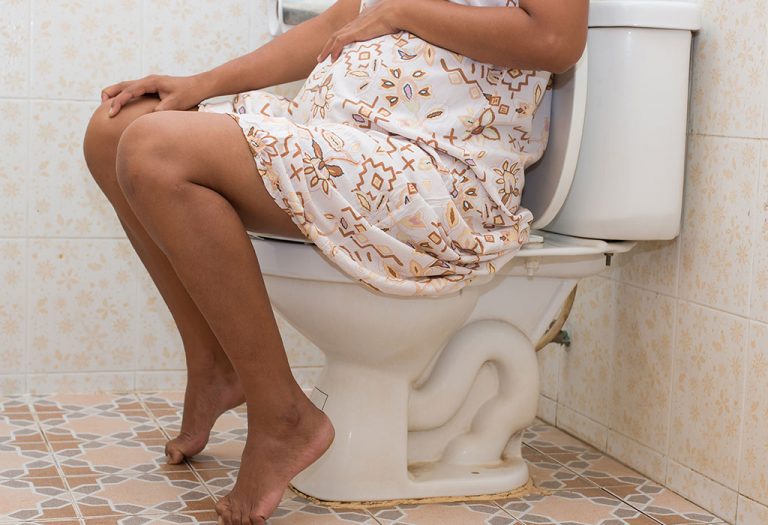Consuming Protein Powder in Pregnancy – Is It Safe?
From types and benefits to shakes and effects, here’s what to know about using protein powder safely in pregnancy.
If you are pregnant, your protein requirements will increase significantly, and you can fulfil those requirements from various food sources – both plant-based and animal-based sources. But if you are vegan or do not eat meat, then you will have to consider protein powder in pregnancy. Is protein powder safe during pregnancy? Protein powder is a good source of protein plus other vital nutrients. However, some of the additives in the powder, such as artificial sugars and preservatives, bring its safety into question, more so during pregnancy. It’s essential to consult with a healthcare professional to ensure the chosen protein powder while pregnant aligns with pregnancy guidelines and safeguards maternal and fetal health.
How Much Protein Does a Woman Need While Pregnant?
The protein requirement of a pregnant woman increases as the pregnancy progresses, and is the highest during the second and third trimesters when the baby is growing rapidly (1). A woman’s protein requirements are considered as per the ideal body weight for her height and not as per actual weight.
The ideal body weight in women can be calculated by this formula:
Height (in cms) − 105 = Ideal body weight (in kgs).
Now, for example, if a woman weighs 70 kg, but her ideal body weight as per the WHO standards is 55 kg, then her protein requirements would be as per 55 kg.
The standard protein requirements of a woman increase trimester-wise, and they mentioned below:
- First Trimester: 1-1.2g of protein per kg ideal body weight.
- Second Trimester: 1.5-1.8g protein per kg ideal body weight.
- Third Trimester: 1.8-2g protein per kg ideal body weight.
Is Protein Powder Safe for Pregnant Women?
Can you have protein powder while pregnant? It cannot be said that protein powder supplements are completely safe for pregnant women, as they often contain artificial sweeteners such as sucralose. Although these artificial sweeteners may be FDA-approved and labelled as generally recognised as safe (GRAS), it cannot be said that they are safe for a pregnant woman and her growing foetus. Their safety is questionable as they are manmade and not natural. Some brands of protein powders can also have ingredients like creatine and caffeine in them, which may not be good for foetal growth (2).
If you want to take protein powder as a supplement during pregnancy, it is suggested that you consult your doctor to understand whether or not you need it, and if so, then which one you should opt for. Since most powders are made out of proteins such as whey, casein, and soy, women allergic to dairy products can switch to other organic protein powders that are safe for consumption during pregnancy.
What Are the Benefits of Protein Powder in Pregnancy?
Introducing protein powder into your diet during pregnancy can offer several advantages, supporting the increased protein needs vital for both maternal and fetal development. Here are seven key benefits of protein powder during pregnancy:
1. Enhanced Protein Intake
Protein powder ensures an efficient and convenient way to meet the heightened protein requirements during pregnancy, promoting overall maternal health and fetal growth (3).
2. Essential Amino Acid Profile
Protein powders often contain a complete spectrum of essential amino acids crucial for fetal development, offering a well-rounded nutritional support system.
3. Digestive Ease
For those experiencing digestive discomfort or difficulty obtaining sufficient protein from whole foods, protein powder can serve as an easily digestible alternative, aiding nutrient absorption.
4. Versatility in Dietary Preferences
Protein powders cater to diverse dietary preferences, accommodating vegans and vegetarians who may find it challenging to meet their protein needs solely through traditional food sources.
5. Energy Boost
With added nutrients and vitamins, protein powder contributes to an energy boost, addressing common pregnancy-related fatigue and supporting the increased energy demands during this crucial period.
6. Management of Nausea and Food Aversions
During the first trimester, when nausea and food aversions can make consuming solid food difficult, a protein shake can be an effective way to maintain essential nutrient intake without triggering discomfort.
7. Support for Postpartum Recovery
Continuing protein powder supplementation after birth can aid in tissue repair and recovery, especially following a cesarean section, and helps support energy levels during the demanding postpartum period.
What Are the Side Effects of Consuming Protein Powder When Pregnant?
Integrating protein powder into your diet during pregnancy can be advantageous, but it’s essential to be aware of potential side effects. Here are four key side effects to consider when consuming protein powder during pregnancy:
1. Digestive Issues
Some pregnant women may experience digestive discomfort, such as bloating, gas, or constipation, when incorporating protein powder into their diet. This can be attributed to certain ingredients or additives present in the protein supplement.
2. Allergic Reactions
Protein powders often contain allergens like dairy or soy. For women with known allergies or sensitivities, the consumption of protein powder may trigger adverse reactions, impacting both maternal well-being and potentially fetal development.
3. Excess Caloric Intake
While protein is essential, excessive intake through protein supplements may lead to an unintentional increase in caloric intake. This can contribute to unhealthy weight gain during pregnancy, posing potential risks to maternal and fetal health (4).
4. Contaminants and Additives
Protein powders may contain contaminants or additives that are not ideal for pregnancy. Substances like artificial sweeteners, preservatives, or heavy metals could be present, raising concerns about their impact on both maternal and fetal health (5).
Different Types of Protein Powders and Their Pregnancy Safety
Introducing protein powder into your pregnancy nutrition requires careful consideration of the type of protein powder chosen. Here are five key types of protein powder and their associated pregnancy safety:
1. Whey Protein
Is whey protein powder during pregnancy safe? Whey protein, derived from milk, is generally considered safe during pregnancy, providing a high-quality source of essential amino acids. However, individuals with lactose intolerance or allergies should exercise caution.
2. Plant-Based Protein
Plant-based protein powders, such as those derived from peas, hemp, or rice, are suitable options for vegan or vegetarian mothers. Ensure the chosen pregnancy-safe protein powder is free from allergens and safe additives.
3. Collagen Protein
Collagen protein, often derived from animal sources, is safe during pregnancy and may offer additional benefits for skin and joint health. However, ensure the product is free from contaminants and additives.
4. Soy Protein
Soy protein is a suitable option for vegetarians and vegans. However, moderation is key due to its phytoestrogen content, which could potentially impact hormonal balance during pregnancy.
5. Egg White Protein
Egg white protein is a highly digestible option, but precautions should be taken to ensure the eggs are pasteurised to eliminate the risk of Salmonella contamination.
Which Protein Shakes Are Safe for Pregnant Ladies
If you’re looking for protein shakes safe for pregnancy, protein shakes that are made naturally, i.e., they do not have artificial flavours, colours, or nutrients added to them, are usually safe to consume. But they should be consumed only after confirming that you are not allergic to that protein source.
There are many brands that promote well-being and use natural colours and flavours. Identifying such brands can help you meet your protein requirements without having to worry about their potential side effects. If you don’t want to buy protein shakes while pregnant from the market, you can always make them at home. After all, homemade is the best! To make a protein shake at home, you can use milk, nuts, peanut butter, pumpkin seeds, sunflower seeds, chia seeds, flax seeds, coconut and other natural ingredients.
How to Make Protein Powder at Home for Pregnancy
Protein powder and pregnancy are sometimes synonymous with each other. Making protein powder at home for pregnancy can provide a tailored and wholesome alternative to commercial products, ensuring you have control over the ingredients. Here’s a simple recipe for homemade protein powder :
Ingredients
- 1 cup almonds
- 1 cup walnuts
- 1 cup sunflower seeds
- 1 cup pumpkin seeds
- 1 cup chia seeds
- 1 cup flaxseeds
- 1 cup hemp seeds
- 1 cup oats
- 1 cup dried coconut flakes
Instructions
- Ensure all nuts and seeds are clean and dry before starting the process.
- In a pan over low heat, roast almonds, walnuts, sunflower seeds, pumpkin seeds, chia seeds, flaxseeds, hemp seeds, and oats until they are lightly browned. Stir frequently to prevent burning.
- Allow the roasted ingredients to cool to room temperature.
- In a blender or food processor, combine the roasted nuts and seeds with dried coconut flakes.
- Blend the mixture until it reaches a fine powder consistency. You may need to do this in batches, depending on the size of your blender.
- Once blended, store the homemade protein powder in an airtight container in a cool, dry place.
Things to Keep in Mind Before Buying Protein Powder
If you must buy protein powder because your regular diet is lacking in protein, check these things before buying it (6).
1. Excess Caffeine and Vitamins
Many protein powder brands that are labelled diet-friendly or vegan have added vitamins and caffeine. You should avoid buying such brands as caffeine, and excess vitamin intake is not recommended during pregnancy. You may already be on a prenatal multivitamin supplement or get all your micronutrients from a balanced diet. Hence, it is pointless and sometimes harmful to consume excessive vitamins. Caffeine intake should also be low during pregnancy and must be limited to under 200mg per day.
2. Artificial Sweeteners
Protein powders containing xylitol, sucralose, and maltitol also have some uncertainty over whether they pose a threat or not. However, as stevia is a plant and occurs in nature, it is considered the best choice among sweeteners. It’s best to avoid powders containing these ingredients. Furthermore, to stay on the safer side, it’s best to avoid all artificial sweeteners and protein powders containing them.
It is important to note that acesulfame K, which is used as a sweetener, is not recommended during pregnancy, breastfeeding, or in children. It is best to go through the nutritional facts and do thorough research on the internet. If you have any questions, you must take the advice of a nutritionist.
3. Fillers and Flavouring Agents
Fillers are substances added to protein powders to add bulk when mixed into a shake. They also give texture and consistency to the drink, which makes it taste better. Some common fillers include xanthan gum, guar gum, palatinose and other ingredients that have little or no nutritional value. They can add some empty calories and make you feel fuller without any actual benefits. Flavouring agents are often devoid of any nutrition, and sometimes they are not as natural as they claim to be. They are treated chemically and processed before making their way into the protein powders. So avoid powders containing fillers and flavouring agents.
4. Where the Powder Is Sourced From
Whatever you eat during pregnancy will reach your baby, too, in some form. So it is extremely important to pay attention to the sources of your protein powder. Check the manufacturer of the powder and its production methods and see if the product is free of pesticides, chemicals, and hormones. Doing some research into how it is made and what goes into their manufacturing methods will help. This is important when you opt for dairy-based powders containing whey and casein. Dairy products often contain traces of hormones such as rBGH (bovine growth hormone), which is not good for the foetus. Plant-based protein is good when it’s organic, and a good brand can always be traced back to its source.
5. Ingredients
Many of the products lately come with a warning label if they have ingredients that are unsuitable for pregnant and breastfeeding women or children. The same goes for protein powders. Usually, these powders contain substances such as creatine, taurine, caffeine, beta-alanine, acetyl L-carnitine HCL and a percentage of vitamins that exceed your dietary recommendations. These labels allow you to choose safe powders, but not all of them come with the labels. Therefore, it is always a good idea to look into the ingredients and identify unsuitable substances.
6. Soy-Based Protein Powders
While soy-based protein powders are a popular plant-based option, pregnant women should be cautious due to their naturally occurring compounds called phytoestrogens. These compounds mimic estrogen in the body, and while moderate soy consumption is generally safe, excessive intake might have hormonal implications during pregnancy. It’s advisable to consult with a healthcare professional before opting for soy-based protein powders to ensure they align with individual health needs and pregnancy guidelines.
FAQs
1. When should you include protein powder in your pregnancy diet?
Protein powder can be included in your pregnancy diet if you struggle to meet increased protein needs through whole foods. Consult with a healthcare professional to determine the right time and type of protein powder based on individual health requirements.
2. Can pregnant women drink protein shakes?
Yes, pregnant women can drink protein shakes if they are made from safe and reputable sources. Opt for protein shakes that align with individual dietary preferences and are free from additives or allergens. However, it’s crucial to consult with a healthcare professional before incorporating protein shakes into your pregnancy diet to ensure they meet specific health needs and guidelines.
This was all about protein powder for pregnant women. Pregnancy is a time of making nutritious choices. If your protein requirements are not being met with the food you eat, you can opt for protein supplements like protein powder, but only after consulting with your doctor. With some research and validation by your doctor, it’s possible to pick a good protein powder to meet your protein requirements.
Also Read:
Collagen Powder During Pregnancy
Consume Maca When Pregnant
Is It Safe to Eat Spirulina in Pregnancy?
Can You Consume Baking Soda While Pregnant?
Was This Article Helpful?
Parenting is a huge responsibility, for you as a caregiver, but also for us as a parenting content platform. We understand that and take our responsibility of creating credible content seriously. FirstCry Parenting articles are written and published only after extensive research using factually sound references to deliver quality content that is accurate, validated by experts, and completely reliable. To understand how we go about creating content that is credible, read our editorial policy here.



































